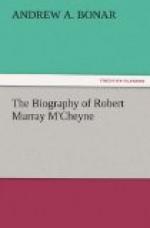He sought to encourage Sabbath schools in all the districts of his parish. The hymn, Oil for the Lamp, was written to impress the parable on a class of Sabbath scholars in 1841. Some of his sweet, simple tracts were written for these schools. Reasons why Children should fly to Christ was the first, written at the New Year 1839; and The Lambs of the Flock was another at a later period. His heart felt for the young. One evening, after visiting some of his Sabbath schools, he writes: “Had considerable joy in teaching the children. Oh for real heart-work among them!” He could accommodate himself to their capacities; and he did not reckon it vain to use his talents in order to attract their attention, for he regarded the soul of a child as infinitely precious. Ever watchful for opportunities, on the blank leaf of a book which he had sent to a little boy of his congregation, he wrote these simple lines:—
Peace be to thee,
gentle boy!
Many years of
health and joy!
Love your Bible
more than play,
Grow in wisdom
every day.
Like the lark
on hovering wing,
Early rise, and
mount and sing;
Like the dove
that found no rest
Till it flew to
Noah’s breast,
Rest not in this
world of sin,
Till the Saviour
take thee in.
He had a high standard in his mind as to the moral qualifications of those who should teach the young. When a female teacher was sought for to conduct an evening school in his parish for the sake of the mill-girls, he wrote to one interested in the cause: “The qualifications she should possess for sewing and knitting you will understand far better than I. She should be able to keep up in her scholars the fluency of reading, and the knowledge of the Bible and Catechism which they may have already acquired. She should be able to teach them to sing the praises of God with feeling and melody. But, far above all, she should be a Christian woman, not in name only but in deed and in truth,—one whose heart has been touched by the Spirit of God, and who can love the souls of little children. Any teacher who wanted this last qualification, I would look upon as a curse rather than a blessing,—a centre of blasting and coldness and death, instead of a centre from which life and warmth and heavenly influence might emanate.”
It was very soon after his ordination that he began his weekly prayer-meeting in the church. He had heard how meetings of this kind had been blessed in other places, and never had he any cause to regret having set apart the Thursday evening for this holy purpose. One of its first effects was to quicken those who had already believed; they were often refreshed upon these occasions even more than on the Sabbath. Some of the most solemn seasons of his ministry were at those meetings. At their commencement, he wrote to me an account of his manner of conducting them: “I give my people a Scripture to be




